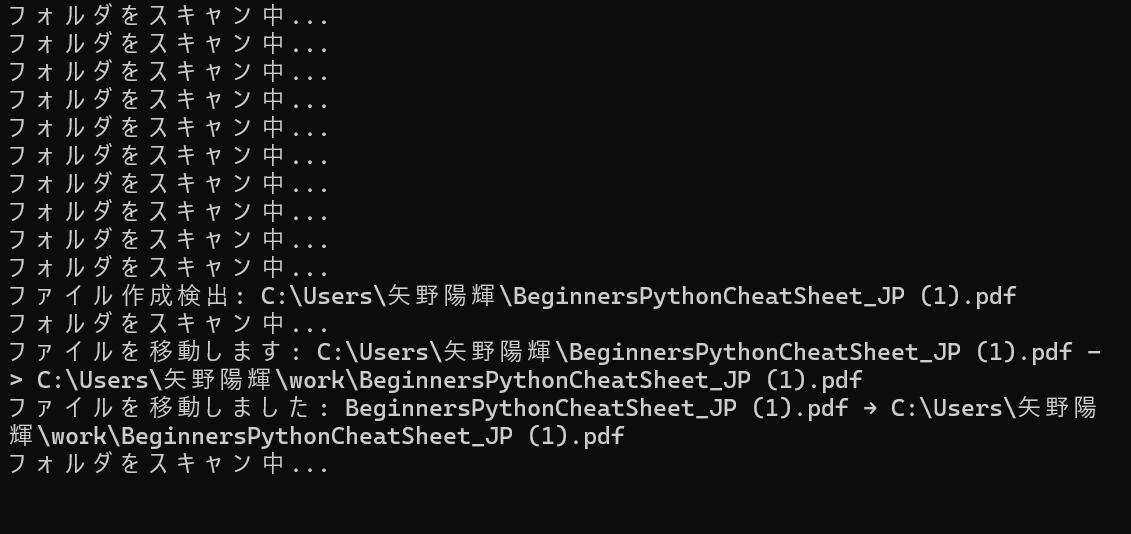Pythonとwatchdogでダウンロードフォルダを自動整理するツールを作ってみた
はじめに
こんにちは!株式会社ヘッドウォータースの新卒1年目の矢野と申します。
みなさんの「ダウンロードフォルダ」、気づいたらファイルでいっぱいになっていませんか?
私自身、日々の業務で Teams からファイルをダウンロードする機会が多い のですが、そのたびにすべてのファイルがダウンロードフォルダに溜まっていくんですよね…。
そこから必要なファイルを目的の作業フォルダに移動するのが、地味に面倒で…。
「これ、自動でやってくれたらラクなのに!」という気持ちから、Pythonで ダウンロードフォルダをリアルタイムで監視し、新しいファイルを指定のフォルダへ自動で移動するツール を作ってみました!
本記事では、そのスクリプトの概要や技術的なポイント、実際の動作、解説していきます!
※わざわざスクリプト組まなくても、Teamsの設定でどのフォルダにダウンロードするか設定できました。。。
使用した技術
-
Python 3.13.1(標準ライブラリ:
os,time,shutil,threading) - watchdog:ファイルシステムの変更をリアルタイムで監視するためのライブラリ
どんなことをするスクリプト?
- 指定したダウンロードフォルダを watchdog で監視
- 新しく作成されたファイルを検知
- 一時ファイル(
.tmp,.crdownloadなど)は無視 - 新しいファイルを作業用フォルダに 自動で移動
- 同名ファイルが存在する場合は名前を加工して保存
コード全文
import os
import time
import shutil
import threading
from watchdog.observers import Observer
from watchdog.events import FileSystemEventHandler
# 設定
DOWNLOADS_FOLDER = r"C:\Users\矢野陽輝"
WORK_FOLDER = r"C:\Users\矢野陽輝\work"
SCAN_INTERVAL = 3 # スキャン間隔(秒)
DEBUG = True # デバッグモード
# スクリプト開始時刻(これ以降に作成されたファイルのみ処理対象)
START_TIME = time.time()
# フォルダ準備
if not os.path.exists(WORK_FOLDER):
os.makedirs(WORK_FOLDER)
print(f"作業ディレクトリを作成しました: {WORK_FOLDER}")
def is_temp_file(file_path):
"""一時ファイルかどうかを判定"""
file_name = os.path.basename(file_path)
return file_name.endswith('.tmp') or file_name.endswith('.crdownload')
def process_file(file_path, existing_files):
"""ファイルを処理してワークフォルダに移動"""
# 基本的なチェック
if not os.path.exists(file_path) or os.path.isdir(file_path):
return False
# 既存ファイルやディレクトリは対象外
if file_path in existing_files:
return False
file_name = os.path.basename(file_path)
# 一時ファイルはスキップ
if is_temp_file(file_path):
if DEBUG:
print(f"一時ファイルのためスキップ: {file_path}")
return False
try:
# ファイルが完全にダウンロードされるまで少し待機
time.sleep(1)
# ファイルが存在し、サイズが0でないことを確認
if not os.path.exists(file_path) or os.path.getsize(file_path) == 0:
return False
# 移動先のパスを作成(重複回避)
dest_path = os.path.join(WORK_FOLDER, file_name)
if os.path.exists(dest_path):
base_name, extension = os.path.splitext(file_name)
counter = 1
while os.path.exists(dest_path):
new_name = f"{base_name}_{counter}{extension}"
dest_path = os.path.join(WORK_FOLDER, new_name)
counter += 1
# ファイルを移動
if DEBUG:
print(f"ファイルを移動します: {file_path} -> {dest_path}")
shutil.move(file_path, dest_path)
print(f"ファイルを移動しました: {file_name} → {dest_path}")
return True
except PermissionError:
# ファイルがまだ使用中
if DEBUG:
print(f"ファイルにアクセスできません(使用中): {file_path}")
return False
except Exception as e:
print(f"{file_name}の移動中にエラーが発生しました: {e}")
return False
class DownloadWatcher:
"""ダウンロードフォルダを監視するクラス"""
def __init__(self, downloads_folder, work_folder):
"""初期化"""
self.downloads_folder = downloads_folder
self.work_folder = work_folder
# 既存のファイルリスト(処理対象外)
self.existing_files = self._get_existing_files()
print(f"既存のファイル {len(self.existing_files)}個 は処理対象外とします")
# 処理中のファイルを追跡
self.processing_files = set()
# 観察対象と監視ハンドラーの設定
self.event_handler = self._create_event_handler()
self.observer = Observer()
self.observer.schedule(self.event_handler, self.downloads_folder, recursive=False)
def _get_existing_files(self):
"""既存ファイルのリストを取得"""
existing = set()
for filename in os.listdir(self.downloads_folder):
file_path = os.path.join(self.downloads_folder, filename)
if os.path.isfile(file_path):
existing.add(file_path)
return existing
def _create_event_handler(self):
"""イベントハンドラーを作成"""
watcher = self
class DownloadHandler(FileSystemEventHandler):
def on_created(self, event):
if event.is_directory:
return
watcher._handle_file_event(event.src_path, "作成")
def on_modified(self, event):
if event.is_directory:
return
watcher._handle_file_event(event.src_path, "変更")
def on_moved(self, event):
if event.is_directory:
return
# 移動先のファイルを処理
watcher._handle_file_event(event.dest_path, "移動")
return DownloadHandler()
def _handle_file_event(self, file_path, event_type):
"""ファイルイベントを処理"""
if file_path in self.processing_files:
return
if DEBUG:
print(f"ファイル{event_type}検出: {file_path}")
# 一時ファイルは処理しない
if is_temp_file(file_path):
if DEBUG:
print(f"一時ファイルを検出: {file_path}")
return
# 処理対象をマークして別スレッドで処理
self.processing_files.add(file_path)
threading.Thread(
target=self._process_in_thread,
args=(file_path,),
daemon=True
).start()
def _process_in_thread(self, file_path):
"""別スレッドでファイル処理を実行"""
try:
# ファイルが確実に完了するまで待機
time.sleep(3)
process_file(file_path, self.existing_files)
finally:
# 処理完了フラグを設定
self.processing_files.discard(file_path)
def start_periodic_scan(self):
"""定期的なフォルダスキャンを開始"""
def scanner():
while True:
try:
time.sleep(SCAN_INTERVAL)
self.scan_folder()
except Exception as e:
print(f"スキャン中にエラーが発生: {e}")
scan_thread = threading.Thread(target=scanner, daemon=True)
scan_thread.start()
def scan_folder(self):
"""フォルダをスキャンして新しいファイルを検出"""
if DEBUG:
print("フォルダをスキャン中...")
try:
# フォルダ内のすべてのファイルをチェック
for filename in os.listdir(self.downloads_folder):
file_path = os.path.join(self.downloads_folder, filename)
# 基本的なフィルタリング
if not os.path.isfile(file_path):
continue
if file_path in self.existing_files:
continue
if file_path in self.processing_files:
continue
if is_temp_file(file_path):
continue
# 作成時刻をチェック
creation_time = os.path.getctime(file_path)
if creation_time < START_TIME:
continue
# 新しいファイルを処理
if DEBUG:
print(f"スキャンで新しいファイルを検出: {file_path}")
self.processing_files.add(file_path)
threading.Thread(
target=self._process_in_thread,
args=(file_path,),
daemon=True
).start()
except Exception as e:
print(f"フォルダスキャン中にエラーが発生しました: {e}")
def start(self):
"""監視を開始"""
# ファイルシステム監視を開始
self.observer.start()
# 定期的なスキャンも開始
self.start_periodic_scan()
print(f"監視中: {self.downloads_folder}")
print(f"ファイルの移動先: {self.work_folder}")
print("ダウンロードフォルダの監視を開始しました。停止するにはCtrl+Cを押してください。")
if DEBUG:
print("デバッグモード: 有効")
try:
# メインスレッドを実行し続ける
while True:
time.sleep(1)
except KeyboardInterrupt:
self.observer.stop()
print("ファイル移動プログラムが停止しました。")
self.observer.join()
if __name__ == "__main__":
# 監視を開始
watcher = DownloadWatcher(DOWNLOADS_FOLDER, WORK_FOLDER)
watcher.start()
ざっくりとした動作の様子
- スクリプトを実行すると、指定したダウンロードフォルダの監視が始まります
if __name__ == "__main__":
watcher = DownloadWatcher(DOWNLOADS_FOLDER, WORK_FOLDER)
watcher.start()
この部分で DownloadWatcher クラスを起動し、ダウンロードフォルダの監視が始まります。
watcher.start() により、ファイルシステム監視と定期スキャンの両方が並行して実行されます。

- Teamsやブラウザから新しいファイルをダウンロードします
ユーザーがファイルをダウンロードすると、ダウンロードフォルダに新しいファイルが追加されます。
この瞬間、watchdog が on_created イベントでその変化をキャッチします。
def _create_event_handler(self):
watcher = self
class DownloadHandler(FileSystemEventHandler):
def on_created(self, event):
if event.is_directory:
return
watcher._handle_file_event(event.src_path, "作成")
def on_modified(self, event):
if event.is_directory:
return
watcher._handle_file_event(event.src_path, "変更")
def on_moved(self, event):
if event.is_directory:
return
watcher._handle_file_event(event.dest_path, "移動")
return DownloadHandler()
on_created:ファイルが新しく作成されたときに呼ばれる関数です。
たとえば、TeamsやChromeでファイルを保存すると、ここがトリガーされます。
- 数秒後に、コンソール上で 移動されたことがログ出力 されます
まずは _handle_file_event 関数が処理対象としてファイルを受け取り、別スレッドで処理を行います:
def _handle_file_event(self, file_path, event_type):
if file_path in self.processing_files:
return
if DEBUG:
print(f"ファイル{event_type}検出: {file_path}")
if is_temp_file(file_path):
if DEBUG:
print(f"一時ファイルを検出: {file_path}")
return
self.processing_files.add(file_path)
threading.Thread(
target=self._process_in_thread,
args=(file_path,),
daemon=True
).start()
そして、最終的に process_file 関数の中でファイルの移動とログ出力が行われます:
if DEBUG:
print(f"ファイルを移動します: {file_path} -> {dest_path}")
shutil.move(file_path, dest_path)
print(f"ファイルを移動しました: {file_name} → {dest_path}")

4. 移動先のフォルダを開くと、新しいファイルが収まります。
実用化のアイデア
- 抽出したファイルを拡張子ごとに分類する
- 日付ごとのサブフォルダを作成して保存
- Windowsのタスクスケジューラへ登録して定期的に実行
- 他のメンバーと共有する Google Drive や OneDrive と連携する
以上のことが出来るのかなと。(実際にはやってないです。)
おわりに
このツールを作ってから、ダウンロード後の整理のストレスが減りました。
「ほんの少しの手間を減らすための自動化」を自分の手で作成するのは結構楽しいです。
(Teamsの設定で出来たので、スクリプト組む必要がなかったのですが、、、)
最後まで読んでいただき、ありがとうございました!
ご意見や、「こんな機能も付けたらいいのでは?」などあれば、ぜひコメントで教えてください!
Discussion